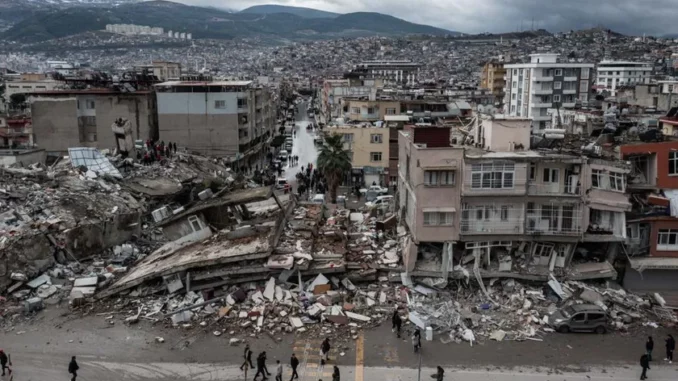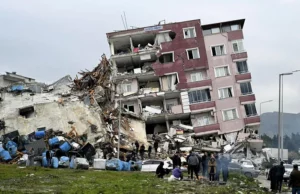The Turkish president’s diplomatic jockeying after the earthquake could lend him leverage ahead of May’s election. Whether this extends to Kurdish and peripheral regions of Turkey, however, will prove decisive.
CURRENT DEATH TOLL IN BOTH TURKEY AND SYRIA IS ABOUT 22,000.

An aerial view of debris of a collapsed building after 7.8 magnitude earthquake hits Hatay, Turkey on Monday.Credit: Murat Sengul / ANADOLU AGENCY
[…] Turkish rescue crews contending with rainy and stormy weather as well as cold temperatures, knew that they hadn’t yet seen the worst of the devastation.
Turkish President Recep Tayyip Erdogan declared Monday’s devastating events as the heaviest calamity Turkey has experienced since a 1939 earthquake that claimed the lives of more than 33,000 people and left some 100,000 injured. Yet even before that earthquake and in the decades that followed, Turkey has continued to be hit by dozens of earthquakes that left a wake of death and destruction.
Ostensibly, Turkey is well-organized and well-equipped for rescue work and for saving victims, compared to two decades ago, when a powerful earthquake hit the city of Izmit. This preparedness, however, doesn’t necessarily apply to the country’s periphery, such as the cities of Gaziantep, Kahramanmaras, Diyarbakir or dozens of towns and villages in the southern and southeastern parts of the country which lie near the earthquake’s epicenter.
These regions also host more than half a million Syrian refugees, having fled to Turkey after the outbreak of Syria’s civil war. The number of hospitals and medical teams working in the country’s south are greatly outnumbered by Turkey’s north, not even near the capacity of cities such as the capital Ankara or Istanbul. Some towns have no emergency ambulance services or rescue equipment, a situation only exacerbated by collapsed roads and downed communications lines.
Rescue and salvage crews from dozens of countries have started arriving in Turkey, including Israel, which has sent a team of 150 people. According to a Turkish journalist who spoke with Haaretz, however, the acute problem now is finding shelter, food and medicine for tens of thousands of survivors amidst fears of more aftershocks. “This is the hardest challenge facing the Turkish government and district governors, and we have no reason to believe that the government is capable of bearing this burden on its own,” the journalist said.
“We’ve seen what happened in less critical situations such as in mine explosions with fatalities, where it took rescue teams many hours or even days before they went into action.” Videos and photos from the disaster area show damage amounting to billions of dollars, as well as serious damage to historical sites such as the old fortress in Gaziantep and a historically important mosque called Yeni Cami in the city of Malatya. The mosque was destroyed in an earthquake 120 years ago and was just reopened last year.
A collapsed building in Hatay, Turkey following a 7.8 magnitude earthquake on Monday.Credit: Ercin Erturk / ANADOLU AGENCY / Anadolu Agency via AFP
For Erdogan, the earthquake poses a double challenge as well as a political risk. The international empathy Turkey is now enjoying, with expressions of sympathy and support by world leaders accompanied by aid delegations, will compete with Turkey’s own rescue efforts. These are factors which could determine the Erdogan’s political future when he is up for election in May.
After deciding to move the election up from June to May in order to weaken opposition organizing efforts, Erdogan now finds himself in a time crunch which will demand of him to demonstrate exceptional leadership and reign in the disaster, and not simply through well-phrased rhetoric. He faces a fractured opposition in which parties have yet to agree upon a leader to run against Erdogan. The candidate was scheduled to be named next Monday, but it’s not certain that the opposition parties will reach a consensus by then.
One of the leading contenders was supposed to be popular Istanbul mayor Ekrem Imamoglu, also a member of the opposition Republican People’s Party. Imamoglu was convicted in December of “insulting a public official” and sentenced to over two years in prison, during which time he is prohibited from participating in political life. This was a calculated and planned move meant to remove a contender with a good chance of defeating Erdogan.
In the meantime, the group of six parties published a long and detailed 240-page document including more than 2,300 items committing to restoring parliamentary democracy in Turkey which they say was destroyed during Erdogan’s one-man uninterrupted, two-decade rule. The document includes commitments relating to human rights, rehabilitating relations with the U.S. and consolidating Turkey’s independent central bank. Under Erdogan, the central bank had become an instrument for implementing his economic theories, leading to skyrocketing inflation and a plummeting currency value.
The Kurdish vote and the HDP (People’s Democratic Party) are expected to be a decisive factor in the upcoming election after earning 11.7 percent of the vote in the 2018 election and becoming the second-largest opposition party.
HDP now faces the risk of being shut down by Turkey’s constitutional court after being accused of having ties to the PKK, the Kurdistan Workers’ Party, which Turkey defines as a terror organization.
The bloc of opposition parties, which itself lionizes nationalism and patriotism, decided not to include the Kurdish party in the bloc and has not promised its representatives senior government posts if the opposition wins.
If their party is shut down, Kurds could join other parties or run as independents. The Kurdish question is now of greater importance due to the earthquake, which hit many areas populated by millions of Kurds, including the capital of the majority Kurdish district, Diyarbakir.
This may be an opportunity for Erdogan to “reconcile” with the Kurds, against whom he’s been waging a military and political battle for years. He could embark on a “politics of disaster” campaign and devote large resources to the rehabilitation of Kurdish areas, possibly even holding political negotiations with their leaders, thereby averting their expected support for the opposition.
On the other hand, it’s obvious that the opposition will be watching Erdogan closely, monitoring every step the government takes in order to assist its citizens and rebuild the ruins. From now on, great efforts will be made not just to extricate the dead and wounded, but also to create a narrative, with a counter-narrative constructed by the opposition. The earthquake has become an unexpected political player, holding the potential to significantly alter the structure of the regime, or, alternatively, to consolidate even further the scope of Erdogan and his party’s rule.




— https://www.wionews.com/videos/turkey-syria-earthquake-rescue-efforts-underway-in-turkiye-death-toll-tops-28000-561061
This seems a most naive proposal, as I see it.
I would be happy to find that this earthquake shook Erdogan from his throne, but again, I seriously doubt that this will be the case. Also didn’t they report that the Kurdish areas were among the hardest hit which will result in thousands fewer votes to cast against their political nemesis? And to top it all off, NATO would desperately love to see this NATO outlier removed from power, which also means he almost certainly won’t be. Mores the pity.
In any event, it does seem that Erdogan has more lives than any ten cats, so I would suggest that, with his likely already having stuffed the voting boxes, neither the best choice of the opposition candidates nor the lack of favor from the Kurds for this anti-Kurdish Islamist, will be enough to prevent everyone’s least favorite Turk from continuing to ruin, err, I mean run things in Turkey.